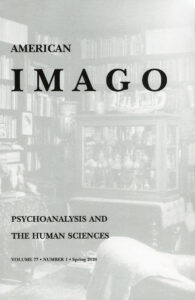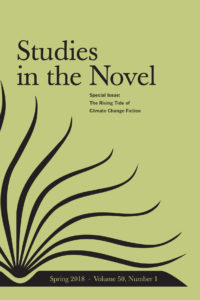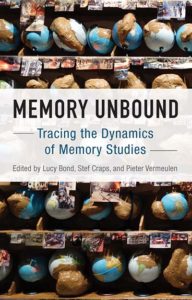Publications
Filter by type:
Gesprek met Christel Stalpaert: "De slagkracht van de verbindingsstreepjes"
Gesprek met Alexander Devriendt: "Het onmogelijke mogelijk maken"
Flooded Cities in Low Countries Fiction: Referentiality and Indeterminate Allegory in Renate Dorrestein’s Weerwater and Roderik Six’s Vloed
In a range of environmentally oriented international novels, future cities in the Low Countries have been flooded, with Dutch populations relocated to higher grounds or to floating cities. In contemporary Dutch and Flemish fiction, however, reflections on cities by the water are few and far between. More conspicuously, in the few literary novels that imagine cities under threat from rising water levels, the cities in question are not located on the shore but further inland, gesturing towards other meanings and symbolical repercussions rather than towards an engagement with flooding per se. This article examines two contemporary flood novels: Roderik Six’s Vloed (“Flood”) and Renate Dorrestein’s Weerwater. We approach the floods in these novels in terms of indeterminate allegory, examining the contradictory meanings that can be attributed to the radical upheavals recounted in these narratives.

Ecological Grief
Introduction
Introduction: Ecological Grief
Stef Craps
Theorizations
Negating Solastalgia: An Emotional Revolution from the Anthropocene to the Symbiocene
Glenn A. Albrecht
“You can never replace the caribou”: Inuit Experiences of Ecological Grief from Caribou Declines
Ashlee Cunsolo, David Borish, Sherilee L. Harper, Jamie Snook, Inez Shiwak, Michele Wood, and the HERD Caribou Project Steering Committee
Ecological Grief and Anthropocene Horror
Timothy Clark
Is Climate-Related Pre-Traumatic Stress Syndrome a Real Condition?
E. Ann Kaplan
Planet Earth: Crumbling Metaphysical Illusion
Robert D. Stolorow
Mediations
Grief as a Doorway to Love: An Interview with Chris Jordan
Stef Craps and Ida Marie Olsen
There Is Grief of a Tree
Paul K. Saint-Amour
Anthropocenic Affects and Ethics in Aaron Thier’s Mr. Eternity
Mahlu Mertens
“His sickness was only part of something larger”: Slow Trauma and Climate Change in Leslie Marmon Silko’s Ceremony
Martin Premoli
Petromelancholia and the Energopolitical Violence of Settler Colonialism in Waubgeshig Rice’s Moon of the Crusted Snow
Reuben Martens
Review Essays
Review of Earth Emotions: New Words for a New World by Glenn A. Albrecht
Ben De Bruyn
Review of Affective Ecocriticism: Emotion, Embodiment, Environment, edited by Kyle Bladow and Jennifer Ladino
Shannon Lambert
Review of Mourning Nature: Hope at the Heart of Ecological Loss and Grief, edited by Ashlee Cunsolo and Karen Landman
Rick Crownshaw
Contributors

Decolonizing English Literature
Introduction: Decolonizing English Literature
Stef Craps
Ankhi Mukherjee
Dévoiler les ténèbres de Conrad: à propos de l’oeuvre spectrale de Michael Matthys
Une interview par Véronique Bragard
Decolonizing the Cli-Fi Corpus
Mahlu Mertens and Gry Ulstein
“A Sense of Being the Foreign-”: Unlearning Western Privilege in J. T. Rogers’s The Overwhelming
Laura Michiels
Climate Trauma
The increasing visibility of climate change and scientists’ alarming warnings about it are taking a toll on people’s mental well-being. This essay surveys the culturally resonant repertoire of new coinages that have emerged in recent years to name and communicate environmentally induced distress. It pays particular attention to the concept of pre-traumatic stress disorder, which has become the focus of a small but important body of humanistic scholarschip calling for an expanded trauma theory that would be future- as well as past-oriented. Noting trauma theory’s persistent human-centredness, the essay goes on to consider attempts that are being made to reconceptualize trauma in non-anthropocentric terms and to acknowledge the interconnectedness and entanglement of human and non-human traumas. It ends by predicting that cultural trauma research, which has so far shown relatively little interest in environmental issues in general and climate change in particular, will engage more fully with our dire environmental predicament in the years ahead.
Tracing Transnational Memory: From Celebration to Critique
In recent years, scholarship on transnational or transcultural memory has become more clear-eyed about the limitations of remembering across national or cultural boundaries. The initial euphoria has dampened: critics these days are more likely to draw attention to factors that impede the flows of memory than to naïvely celebrate mnemonic mobility. Even so, contemporary memory research holds on to the ethical potential of transnational and transcultural paradigms of remembrance.
Récemment, la recherche sur la mémoire transnationale ou transculturelle est devenue plus lucide quant aux limites de la mémoire au-delà des frontières nationales ou culturelles. L’euphorie initiale s’est estompée: les critiques de nos jours sont plus susceptibles d’attirer l’attention sur les facteurs qui entravent les flux de mémoire que de célébrer naïvement la mobilité mémorielle. Toutefois, la recherche contemporaine sur la mémoire conserve le potentiel éthique des paradigmes mémoriels transnationaux et transculturels.
Towards an Understanding of Drone Fiction
Since the end of the twentieth century, strike-capable military drones have rapidly evolved from an ominous near-future technology, seldom discussed outside of science fiction or top-secret military contexts, to a burgeoning multi-billion dollar international industry at the centre of public scrutiny and interest. Meanwhile, the figure of the drone has saturated Western public consciousness to the point that it can be described as a trope. Sparking the interest of artists, writers, and filmmakers, drone warfare has begun to feature in a wide range of films, books, and art installations, and this flood of drone-related media seems unlikely to peter out. To date, however, little academic work has looked in depth at cultural interpretations of drones and the role they serve in fictional(ized) narratives. What is urgently needed to better our understanding of the drone, we argue, is a cultural studies perspective that is able to assess the drone as a fictional, narrative construct, while still taking account of its very real, material consequences for both pilots and victims. This article aims to introduce readers to the nascent field of drone fiction, providing a jumping-off point for future research into the figure of the drone. Here, we explore how drone warfare is mediated through three different drone-fictional works: the semi-autobiographical book The Drone Eats with Me by Atef Abu Saif, the experimental video game Unmanned by Molleindustria, and the short film 5,000 Feet Is the Best by Omer Fast. Through close readings of these varied works, we draw attention to what each particular mode of mediation reveals about the effects of drones on those who work with or live around them.
Testimony for #WeChangeForLife
Op wandel met Guido in Leuven, Gent en Ieper
Last Aboriginal Person Standing in a Climate-Changed Australia: A Conversation with Alexis Wright
Klimaatfictie in de Lage Landen?
Met het water al bijna aan de lippen vragen Stef Craps en Mahlu Mertens zich af of de klimaatopwarming Nederlandstalige fictieschrijvers niet een beetje te koud laat.
Jeff Nichols's Take Shelter (2011): Psychic Cli-Fi
This essay gives an overview of the central themes and formal features of Jeff Nichols’s cli-fi film Take Shelter (2011). It also provides insight into the film’s reception and contribution to public debate, as well as offering some teaching ideas.
Beyond Identification in Human Rights Culture: Voice of Witness’s Voices from the Storm and Dave Eggers’s Zeitoun
In this article, we analyse two testimonial narratives written or published by Dave Eggers, an American author, editor, and publisher whose oeuvre shows a marked interest in harnessing the power of narrative to engage in human rights activism. Both narratives focus on the case of Abdulrahman Zeitoun, a Syrian-American who suffered in the aftermath of Hurricane Katrina and at the hands of the state through its response to that natural disaster. Our analysis challenges many of the assumptions with regard to affect that dominate the field of human rights and literature, which often takes for granted the intricate and treacherous process that undergirds a reader’s engagement with testimonial narratives. Affective engagement with the reader is a key feature of Eggers’s works, yet we show how it operates in a way that actively shapes the affective tenets of human rights culture in order to allow the reader to engage with the disempowered on more equal terms.

The Rising Tide of Climate Change Fiction
Introduction: The Rising Tide of Climate Change Fiction
Stef Craps and Rick Crownshaw
Beauty That Must Die: Station Eleven, Climate Change Fiction, and the Life of Form
Pieter Vermeulen
The Rest Is Silence: Postmodern and Postcolonial Possibilities in Climate Change Fiction
Adeline Johns-Putra
The Hot War: Climate, Security, Fiction
Ben De Bruyn
Tearing Down the Greenhouse: Visual Ecology, Savvy Critics, and Climate Change in T. C. Boyle’s The Terranauts
River Ramuglia
From the Grotesque to Nuclear-Age Precedents: The Modes and Meanings of Cli-fi Humor
Courtney Traub
The Novel after Nature, Nature after the Novel: Richard Jefferies’s Anthropocene Romance
Jesse Oak Taylor
Contemporary Fiction vs. the Challenge of Imagining the Timescale of Climate Change
Mahlu Mertens and Stef Craps
Cli-fi, Petroculture, and the Environmental Humanities: An Interview with Stephanie LeMenager
River Ramuglia
Contributors
Samuel Beckett, Eindspel
Memory Studies Goes Planetary: An Interview with Stef Craps
Memory Studies and the Anthropocene: A Roundtable
The essays gathered here are slightly revised versions of the position papers presented as part of the roundtable on “Memory Studies and the Anthropocene” at the MLA Convention in Philadelphia in January 2017. What sparked this roundtable is the increasing currency of the Anthropocene, on the one hand, and the observation that the field of memory studies has lately begun to grapple with its implications in earnest, on the other. The participants, all of them leading scholars in the fields of memory studies and/or the environmental humanities, had been asked to respond to the following questions: “What are the implications of the notion of the Anthropocene for memory studies? How, if at all, does the awareness of living in a new geological epoch defined by the actions of human beings affect the objects of memory, the scales of remembrance, and the field’s humanist underpinnings?”
Introduction: The Rising Tide of Climate Change Fiction
The call for papers for this collection on “The Rising Tide of Climate Change Fiction” arose from concerns about pessimistic assessments, in recent literary criticism, of the novel’s ability to meet the representational challenges posed by the pressing planetary problem of climate change. The contributions to this volume take issue with that pessimism and take stock of the novel’s capabilities.
De verbeelding van het Antropoceen
Het Antropoceen is geen puur geologische aangelegenheid. Het concept mag dan wel uit de koker van “harde” wetenschappers zijn ontsproten; het zorgt ook voor grote bedrijvigheid bij “zachte” wetenschappers en cultuurmakers. Zij worstelen met de morele en existentiële vragen die het tijdperk van de mens oproept.
Contemporary Fiction vs. the Challenge of Imagining the Timescale of Climate Change
Fiction writers who try to do justice to the vast temporal and spatial scales and the enormous complexity of climate change are faced with the problem that the phenomenon exceeds human perception and that it is not dramatic in the traditional sense. In this article we explore the formal challenges that arise when fiction takes on the temporality of climate change by examining three very different novels that seek to capture the geological timescale. We analyze Richard McGuire’s time-bending graphic novel Here (2014), Dale Pendell’s fictional future history The Great Bay (2010), and Jeanette Winterson’s cautionary science-fiction tale The Stone Gods (2007) through the lens of Barbara Adam’s concept of the timescape, Rob Nixon’s idea of slow violence, and Timothy Clark’s notion of destructive doubles to see what kinds of literary innovations and translations the timescale of climate change has provoked. In doing so, we ponder Clark’s question, posed in his recent book Ecocriticism on the Edge: The Anthropocene as a Threshold Concept (2015), whether humans are constitutionally incapable of imagining the Anthropocene—the new geological epoch defined by the action of humans of which climate change is the most salient manifestation—or whether authors can adequately depict and convey it by disrupting conventional modes of representation. We conclude that while each of the three novels ultimately falls short in this regard, collectively they do chart possible pathways for successful literary treatment of the most pressing ecological threat of our time.
Roundtable: Moving Memory
This roundtable brings together a group of academics and artists working throughout Europe to discuss the question of memory in theoretical and artistic contexts at a historical moment highly preoccupied with acts of commemoration and moving memory.
Convened by Charlotte McIvor and Emilie Pine
Participants: Stef Craps, Ghent University;
Astrid Erll, Goethe-University Frankfurt am Main;
Paula McFetridge, Kabosh Productions;
Ann Rigney, Utrecht University;
Dominic Thorpe, artist
On Not Closing the Loop: Empathy, Ethics, and Transcultural Witnessing
That an empathic response to testimonies can lead to altruism is a key assumption of much cultural research on trauma and witnessing, which prides itself on its ethical commitment. Most trauma theorists also agree that empathy is to be distinguished from forms of affective involvement that do not recognize and respect the otherness of the other, and which are variously referred to as sympathy, projective identification, incorporation, or crude empathy. While this caveat against imperialism and appropriation is meant to prevent empathy from turning into a closed-loop process, canonical trauma theory itself has been plagued by Eurocentrism from its inception, as it tends not to adequately address the sufferings of members of non-Western or minority groups. In this essay, I will discuss the challenges that transcultural witnessing poses for empathic understanding and ethical thinking, using both theoretical and literary texts as examples, and focusing specifically on Dave Eggers’s novel What Is the What. Published by McSweeney’s in 2006, What Is the What, subtitled The Autobiography of Valentino Achak Deng, is a collaborative first-person testimony that tells the story of a refugee from the second Sudanese civil war. I argue that in this book Eggers manages both to stay true to the continuing cultural demand for empathy with distant others and to defuse or counter the prevailing scepticism about the morality of empathic identification that tends to find such efforts hopelessly wanting. What Is the What does not resolve all the moral ambiguities surrounding transcultural witnessing, but it is unafraid to confront them and refuses to be paralysed by them. The novel harnesses feeling in the face of suffering while continually reminding the reader that Deng’s experiences are not his or hers to inhabit. Rather than solidifying an already existing community, it calls a community of otherwise distant and disconnected people into being for the purposes of alleviating suffering.

Memory Unbound: Tracing the Dynamics of Memory Studies
What unites much of the most exciting research going on in the field of memory studies today is a tendency to regard memory not as fixed but as fluid, not as static but as dynamic, not as bound but as unbound. Memory is increasingly being studied as something that does not stay put but circulates, migrates, travels; it is more and more being conceptualized as a process, as work that is continually in progress, rather than as a reified object. Memory Unbound is the first book to systematically explore the four most important dimensions of the mobility of memory: its transcultural, transgenerational, transmedial, and transdisciplinary drift. While these dimensions have been treated separately to a greater or lesser extent in a number of publications, this collection considers them comprehensively and in an integrated manner. Bringing together many of the leading scholars of memory with emerging voices in the field, Memory Unbound transforms our current knowledge of the movements of memory across cultures, generations, media, and disciplines and sets an ambitious agenda for the future of memory studies.
Endorsements and reviews:
Memory Unbound is exemplary of the research and writing of the “third wave” of memory studies. It heralds a new departure in keeping with the transforming effects of new technologies of communication, and conveys the energy and excitement attending the precipitous emergence and rapid development of this new realm of scholarship.
Patrick Hutton, University of Vermont
This is a great book – provocative, timely, and thoughtful. It proposes a future for memory research that finds a place for new investigators to embed their ideas.
Joanne Garde-Hansen, University of Warwick
The volume provides a comprehensive examination of the field of memory studies, from a range of disciplines and approaches and using global case studies. The dynamic compilation of essays is attentive to shifts in the field towards interdisciplinarity and provides a nuanced account of the dynamics of memory across various contexts. . . . This volume of essays is a significant contribution to the field as it provides a critical understanding of memory across media and disciplines, and will be of interest to a wide range of scholars working in the field of memory studies.
Tanja Bosch, Memory Studies (12.1 (2019): 98-101)
Memory Unbound is an outstanding volume of essays that represents an indispensable reference point for all scholars of memory studies. It brings together the very latest in memory studies scholarship from a diverse range of perspectives that together showcase the ways in which the field can and should traverse borders of various kinds. The twelve essays and introduction that constitute this volume are immaculately edited and well written, and combine theory and practice in exemplary ways.
Sara Jones, Témoigner: Entre histoire et mémoire (126 (Apr. 2018): 156-58)
Contents:
Introduction. Memory on the Move
Lucy Bond, Stef Craps, and Pieter Vermeulen
Chapter 1. Staging Shared Memory: Je Veux voir and L’Empreinte de l’ange
Max Silverman
Chapter 2. Remembering the Indonesian Killings: The Act of Killing and the Global Memory Imperative
Rosanne Kennedy
Chapter 3.Transnational Memory and the Construction of History through Mass Media
Aleida Assmann
Chapter 4. Small Acts of Repair: The Unclaimed Legacy of the Romanian Holocaust
Marianne Hirsch and Leo Spitzer
Chapter 5. Fictions of Generational Memory: Caryl Phillips’s In the Falling Snow and Black British Writing in Times of Mnemonic Transition
Astrid Erll
Chapter 6. The Uses of Facebook for Examining Collective Memory: The Emergence of Nasser Facebook Pages in Egypt
Joyce van de Bildt
Chapter 7. Connective Memory: How Facebook Takes Charge of Your Past
José van Dijck
Chapter 8. Embodiments of Memory: Toward an Existential Approach to the Culture of Connectivity
Amanda Lagerkvist
Chapter 9. Metaphorical Memories of the Medieval Crusades after 9/11
Brian Johnsrud
Chapter 10. The Agency of Memory Objects: Tracing Memories of Soweto at Regina Mundi Church
Frauke Wiegand
Chapter 11. Cultural Memory Studies in the Epoch of the Anthropocene
Richard Crownshaw
Chapter 12. “Filled with Words”: Modeling the September 11 Digital Archive and the Utility of Digital Methods in the Study of Memory
Jessica K. Young
Bibliography
Index
Introduction: Memory on the Move
This introductory essay situates the four sections of the book in ongoing discussions on the methods, ethics, and politics of memory studies. Starting from the observation that memory is increasingly being studied as a dynamic process rather than a static product, it identifies the four main dimensions of mnemonic mobility in a globalized and digitalized world: transcultural, transgenerational, transmedial, and transdisciplinary. Underlining that these four dimensions cannot be studied in isolation from each other, it contends that attention to the interrelations between them is indispensable for the study of memory today. The essay shows how all twelve chapters in the book contribute to the project of capturing the dynamics of memory.
Climate Change and the Art of Anticipatory Memory
This essay explores a narrative device familiar from sci-fi and dystopian fiction that is commonly used in literary and cultural responses to climate change, and which is particularly suggestive for thinking through the implications of the Anthropocene for memory and the field of memory studies. Works as generically diverse as Franny Armstrong’s film The Age of Stupid (2009), Naomi Oreskes and Erik M. Conway’s fictional future history The Collapse of Western Civilization: A View from the Future (2014), George Turner’s novel The Sea and Summer (1987), and Jan Zalasiewicz’s popular science book The Earth after Us (2008) all feature a historian, archivist, or geologist who looks back on our present moment from a distant vantage point in a dystopian, (almost) post-human future irrevocably marked by climate change. These works can thus be seen to respond to the challenge of the Anthropocene—an era that requires the future anterior tense for its very conceptualization—to consider human and inhuman scales in relation to one another. The preoccupation with anticipated memory and preliminary or proleptic mourning evident in fictional future histories of climate change, which subvert the customary parameters of memory in terms of both scale and directionality, resonates with recent calls for memory studies to become more future-oriented instead of merely backward-looking. Scholars typically seek to make memory studies relevant to the present and the future by forging more robust links between memory and transitional justice or human rights discourses. Climate fiction of the future-history variety—which mourns future losses proleptically in order for these losses not to come to pass in the first place—presents another promising avenue for further research in the same spirit.
The Grey Zone
Humanitarianism, Testimony, and the White Savior Industrial Complex: What Is the What versus Kony 2012
This article compares Dave Eggers’s What Is the What and Invisible Children’s Kony 2012, two recent and much-debated instances of human rights advocacy that mobilize subaltern testimonies. They do so in mutually illuminating ways, as they interact quite differently with the neocolonial discourses that come into play as Western activists and audiences engage with the disenfranchised voices of the Global South. We argue that Kony 2012 appropriates the subaltern’s voice and subsequently reaffirms colonial power relations by evoking a strong sense of the charitable West sympathetically giving to the perpetually inferior and destitute South. Eggers’s use of testimony, by contrast, is collaborative rather than appropriative, and is therefore able to challenge through both its form and its content many of the detrimental neocolonial assumptions and hierarchies that abound in Invisible Children’s campaign.
The One. Essay on Roger Federer
Playing with Trauma: Interreactivity, Empathy, and Complicity in The Walking Dead Video Game
Just as books and films about traumatic events have become part of Western popular culture, so the theme of trauma and its accompanying tropes have been seeping into video games over the last two decades. In spite of the discernible trauma trend within video games, however, and the potential they exhibit for representing trauma in new ways, they have received very little critical notice from trauma theorists. In this article, we argue that a trauma-theoretical study of games has much to offer our understanding of the ways that trauma can be represented, in addition to giving game studies scholars further insight into how games manage to elicit such strong emotions and difficult ethical quandaries in players. We demonstrate this by performing a close reading of one recent and much-discussed game, The Walking Dead: Season One, analyzing how it incorporates psychological trauma in terms of inter(re)activity, empathy, and complicity.
